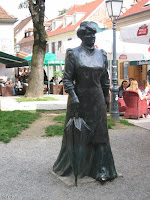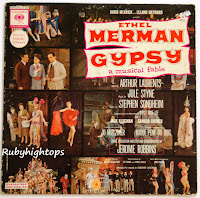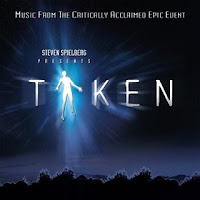

When I was growing up in what was than Yugoslavia, we didn't have many famous stars visiting our concert halls. Yes,I've heard about Louis Armstrong or Ella or Oscar Peterson coming around but these legendary concerts were part of their East European tours and more accident than a rule - for the most of the times really big names were not interested in going behind "iron curtain" I guess, we would watch them on TV and read about them in the magazines, accepting that musicians who were coming were now at the twilight of their careers. For the last 20 or so years it started to change slowly and now suddenly it became almost normal that big stars casually visit our little corner of the world when they tour Europe - from the top of my head I recall David Bowie, Tina Turner, Bob Dylan, Leonard Cohen, Elton John, George Michael, Natalie Cole and many more. This week we had Lenny Kravitz, Tom Jones and Sade playing back to back next to each other.
Now,I'm not a teenager anymore and no matter how much I enjoy music, it's not easy to get me out of the house. Not exactly sure why is it so,but when I'm not traveling it really comforts me to stay in the house and just rest - maybe because I'm traveling all the time,I appreciate and enjoy quiet evening at home with no work and obligations. But Tom Jones intrigued me and I kept looking at his posters, thinking it must be now or never because he's getting older and maybe I won't have next chance. Actually he was the only contender from the start,since I wouldn't bother with other two stars anyway - Kravitz sounded interesting at the start of his career but soon turned into empty posturing and Sade might sell millions of records but sound too sleepy and mellow for my taste. Jones is something else,old lion with decades of success behind him and a great repertoire of evergreen hits + new contemporary material,no competition here whatsoever.
Since my friends were equally enthusiastic, we all went in "Arena" just to find ourselves surrounded with mostly middle-aged audience and we had fun noticing we were actually "young" here. For some reason concert started one hour later and we didn't like this, because nobody else played at the start so we just waited and waited and I said what is this,they really had enough time to adjust all the buttons and lights,it is not fair towards the people who came in the cold Monday evening to be in time and now are all waiting. So when Tom Jones finally arrived on the stage I didn't even welcome him with applause because I was a bit put off with this nonchalant behavior. Very soon I relaxed because after all this is Tom Jones on the stage playing live and he did sound much better than I expected - he is much older now and visibly don't move around the stage much,just occasionally walking a little but the voice is still there, great roar with that instantly recognizable sound.
As the atmosphere slowly became more and more heated, I became aware of the audience - don't remember when was the last time that I saw such honestly happy audience,it was like Christmas and New Year at the same time - at certain point I wasn't sure am I enjoying Tom Jones at the stage or crazy audience more. There was almost nothing from his old "sex God" behavior left now because he is elderly grandfather and main focus was on music,but women were hysterical and I mean really hysterical. Screaming, dancing, clapping hands, heads shaking like it's heavy metal concert, my God what a happiness - and not only women, men were equally excited, there was one young guy behind us who was so impressed with Tom Jones roaring trough the dark blues "Burning Hell" that he yelled "that's it old man!" with admiration. Towards the end it really became a celebration, nobody was seated anymore and 5 000 people were in a palm of Jones hand. As for me, I was intrigued what exactly are we going to hear,since Tom Jones had decades worth of repertoire - predictably he had to satisfy the audience with his old classics but each time he put a different twist on them so they did not sound exactly like a copy of recordings but fresh. "The Green,green grass of home" became less country and more new age ballad with some impressive harmonizing with backing musicians, while "Delilah" started like acoustic flamenco and turned into really spanish fiesta, that was very good and impressive.He covered almost everything - from his very first recording "Chills and fever" to "I'll never fall in love again" to "What's new pussycat" and "Thunderball" to his recent gospel recordings like "Didn't it rain" and naturally "Sexbomb" and "Kiss" got everybody dancing and screaming. Myself I couldn't sit anymore when he started "It's not unusual" because it's such a feel good song that I found myself joining already crazed audience. Women in front of me really lost their minds and were bawling & screaming like possessed teenagers. If the entertainment means to make people forget about their depressive little lives for two hours, Tom Jones is a great entertainer.














































